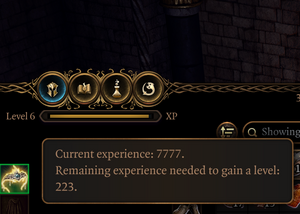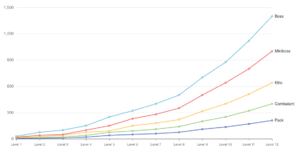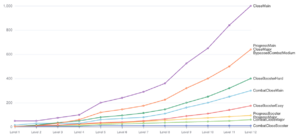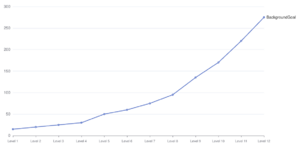Ad placeholder
Experience
Characters experience
All characters start at 0 experience and gain levels when they receive enough experience. After gaining 100,000 experience, they reach level 12 and no further experience is gained.
The experience cumulated at each level and the experience required to reach the next level is described in the following table:
| Level | Cumulative exp. | Exp. for next level |
|---|---|---|
| 1 | 0 | 300 |
| 2 | 300 | 600 |
| 3 | 900 | 1,800 |
| 4 | 2,700 | 3,800 |
| 5 | 6,500 | 6,500 |
| 6 | 13,000 | 8,000 |
| 7 | 21,000 | 9,000 |
| 8 | 30,000 | 12,000 |
| 9 | 42,000 | 14,000 |
| 10 | 56,000 | 20,000 |
| 11 | 76,000 | 24,000 |
| 12 | 100,000 | N/A |
When gaining experience, it is usually earned by all the companions who have joined the player, whether they are in the active party or at the campsite. The only exception is when a character is succeeding a background goal, in which case only that character earns the experience.
If the player's main character has more experience than one or more party members, the player can remove them from the party and add them back, their experience will now be equal to the main character.
Sources of experience
There are 4 sources of experience in the game:
- defeating creatures
- discovering locations
- completing quests and quest steps
- succeeding background goals (which also grants inspirations)
In many occurrences during the game, the player has the possibility to side with a creature for the purpose of succeeding a quest, then kill them afterwards. In doing so they effectively gain the experience from succeeding the quest and the experience from defeating the creature. For example, the player can side with Nere for the purpose of succeeding Free True Soul Nere, then kill him and his minions afterwards to obtain the maximum of experience as possible (in addition of obtaining both the quest rewards and his items).
Discovering locations is the only source of experience that scales with the main character level. As a result, the amount of experience granted for visiting an area will be different from one player to another, depending of when each player visits the area for the first time.
The amount of experience rewarded by defeating a creature, discovering a location or completing a quest is not visible in the user interface until the task is completed. Once completed, the amount of experience gained will briefly appear on screen, as well as in the Combat Log.
Defeating creatures
The amount of experience obtained by defeating a creature is determined by:
- the creature level (see below for an exception)
- the reward category assigned to the creature
There are 7 reward categories, which are are not visible anywhere in the user interface. From less to most rewarding:
- Zero
- Civilian
- Pack
- Combatant
- Elite
- Miniboss
- Boss
Defeating "Zero" and "Civilian" creatures grants respectively 0 and 1 experience at any level. "Pack" creatures are the next weakest category and will provide much less experience than "Boss" creatures. For example, Nere is a level 5 "Elite" creature, so defeating him rewards 90 experience. His minions are level 5 "Combatant" creatures, so defeating them rewards 75 experience each. Creatures of level 13 and above will provide as much experience as a level 12 creature.
If the creature level is lower than the area level, then the game uses the area level instead of the creature level to choose the reward. For example, when defeating a level 1 "Combatant" Goblin creature in the level 3 Blighted Village area, the game will use the area level and grant the experience rewarded by a level 3 "Combatant", so 20 experience.
Examining a creature doesn't provide its reward category, preventing the player to determine the precise amount of experience it will reward. However, the player can approximate it using the creature level, visible in the Examine window or while hovering the creature. The area level is not provided in the user interface either.
The experience granted by each level and each reward category is described in the following table:
| Reward categories | |||||||
|---|---|---|---|---|---|---|---|
| Level | Zero | Civilian | Pack | Combatant | Elite | Miniboss | Boss |
| 1 | 0 | 1 | 3 | 10 | 15 | 20 | 30 |
| 2 | 0 | 1 | 5 | 15 | 25 | 40 | 75 |
| 3 | 0 | 1 | 10 | 20 | 40 | 50 | 100 |
| 4 | 0 | 1 | 20 | 40 | 75 | 100 | 150 |
| 5 | 0 | 1 | 40 | 75 | 90 | 150 | 250 |
| 6 | 0 | 1 | 50 | 90 | 150 | 230 | 320 |
| 7 | 0 | 1 | 60 | 110 | 180 | 280 | 400 |
| 8 | 0 | 1 | 75 | 140 | 220 | 350 | 500 |
| 9 | 0 | 1 | 110 | 200 | 315 | 500 | 700 |
| 10 | 0 | 1 | 135 | 250 | 400 | 640 | 875 |
| 11 | 0 | 1 | 170 | 320 | 510 | 800 | 1,120 |
| 12+ | 0 | 1 | 210 | 400 | 640 | 1,000 | 1,400 |
The category "Zero" is actually the most used category in the game, it is assigned to 82 creatures.
The following table shows how many times each reward category is used in the game:
| Zero | Civilian | Pack | Combatant | Elite | Miniboss | Boss | |
|---|---|---|---|---|---|---|---|
| Creatures | 82 | 21 | 36 | 47 | 26 | 15 | 12 |
Defeating a creature can reward no experience if the player already resolved the encounter without fighting. For instance, if the player peacefully talks their way out of an encounter, they will gain the same experience as if they had killed the creatures. Killing them afterwards will not earn the player any more experience. This is to prevent the player to double up on experience. When resolving the encounter peacefully, the player gets the experience for the creature they interacted with, as well as the experience for all the nearby creatures who would normally join the fight if the player decided to attack. For example, when entering the Crèche Y'llek and attacking Far'aag, the 3 other NPCs in the room join the fight. Killing them grants 75 each, since they are level 5 "Combatant" creatures, for a total of 300 experience. Instead of attacking, the player can talk with Far'aag to avoid a fight, in which case they are granted 300 experience too. Killing the 4 NPCs afterwards grants 0 experience.
Discovering locations
The amount of experience obtained by discovering locations (internally referenced as "Exploration Reward") is determined by:
- the area level (see below for an exception)
- the reward category assigned to the area
There are 4 reward categories, which are not visible anywhere in the user interface. From less to most rewarding:
- Small
- Medium
- Big
- LevelBoost (which is not actually assigned to any area)
Similarly, the area level is not visible anywhere in the user interface.
If the area level is lower than the main character level, then the game uses the main character level instead of the area level to choose the reward. For example, when discovering Crèche Y'llek, which is a level 5 "Big" area, if the main character is level 5, it will grant 240 experience; if the main character is level 6, it will grant 280 experience; and if the main character is level 7, it will grant 300 experience.
The experience granted by each level and each reward category is described in the following table:
| Reward categories | ||||
|---|---|---|---|---|
| Level | Small | Medium | Big | LevelBoost |
| 1 | 5 | 10 | 15 | 100 |
| 2 | 10 | 20 | 30 | 200 |
| 3 | 30 | 60 | 90 | 300 |
| 4 | 40 | 75 | 130 | 500 |
| 5 | 80 | 150 | 240 | 1,000 |
| 6 | 95 | 180 | 280 | 1,100 |
| 7 | 115 | 210 | 300 | 1,200 |
| 8 | 150 | 275 | 370 | 1,500 |
| 9 | 210 | 400 | 530 | 2,000 |
| 10 | 260 | 500 | 660 | 2,400 |
| 11 | 330 | 630 | 850 | 3,400 |
| 12 | 420 | 780 | 1,000 | 5,000 |
The category "LevelBoost" is actually never used in the game, and the category "Small" is the most used one, it is assigned to 39 areas.
The following table shows how many times each reward category is used in the game:
| Small | Medium | Big | LevelBoost | |
|---|---|---|---|---|
| Areas | 39 | 15 | 11 | 0 |
Completing quests and quest steps
The quests on themselves don't grant experience on completion, but their steps do. All the quests are divided into steps (internally referenced as "QuestStep") and each step has its own experience reward. The steps are shown in the user interface, inside the Quest Journal. By clicking on a quest on the left side, all the completed steps for this quest are listed on the right side. The amount of experience obtained for a step is not visible in the Journal. While a step might not be required to complete a quest, it still can grant some experience, usually a small amount.

The amount of experience obtained by completing a step is determined by:
- the level of the area that triggers the completion
- the reward category assigned to the step
There are 11 reward categories, which are not visible anywhere in the user interface. From less to most rewarding:
- CombatCloseBooster
- CombatCloseMajor
- ProgressBooster
- ProgressMajor
- CloseBoosterEasy
- CombatCloseMain
- CloseBoosterHard
- ProgressMain
- CloseMajor
- BypassedCombatMedium
- CloseMain
There is actually a 12th category, "BackgroundGoal", but as its name suggests, it is not assigned to completing quests but to succeeding background goals.
For example, in the quest Find the Blood of Lathander occurring in Act One, one of the steps is "We learned that a powerful holy relic, the Blood of Lathander, could be somewhere nearby. We should keep an eye out for it as we explore the monastery.". Its reward category is "ProgressMajor" and its completion triggers inside the Rosymorn Monastery, which is a level 5 area. So completing this step grants 30 experience.
The experience granted by each level and each reward category is described in the following table:
| Reward categories | |||||||||||
|---|---|---|---|---|---|---|---|---|---|---|---|
| Level | Combat Close Booster |
Combat Close Major |
Progress Booster |
Progress Major |
Close Booster Easy |
Combat Close Main |
Close Booster Hard |
Progress Main |
Close Major |
Bypassed Combat Medium |
Close Main |
| 1 | 5 | 5 | 5 | 5 | 5 | 15 | 5 | 5 | 20 | 30 | 50 |
| 2 | 5 | 10 | 10 | 10 | 10 | 30 | 15 | 10 | 30 | 50 | 50 |
| 3 | 5 | 10 | 15 | 15 | 15 | 30 | 35 | 30 | 45 | 70 | 75 |
| 4 | 5 | 10 | 20 | 20 | 25 | 30 | 50 | 60 | 60 | 100 | 100 |
| 5 | 10 | 20 | 30 | 30 | 35 | 60 | 80 | 120 | 120 | 200 | 200 |
| 6 | 10 | 25 | 35 | 35 | 40 | 70 | 95 | 145 | 145 | 240 | 240 |
| 7 | 10 | 30 | 45 | 45 | 50 | 80 | 115 | 175 | 175 | 290 | 290 |
| 8 | 10 | 35 | 55 | 55 | 65 | 110 | 145 | 225 | 225 | 360 | 360 |
| 9 | 10 | 40 | 65 | 65 | 90 | 160 | 200 | 320 | 320 | 525 | 525 |
| 10 | 10 | 45 | 75 | 75 | 110 | 200 | 250 | 400 | 400 | 400 | 650 |
| 11 | 10 | 50 | 85 | 85 | 140 | 250 | 320 | 500 | 500 | 500 | 840 |
| 12 | 10 | 60 | 95 | 95 | 175 | 300 | 400 | 640 | 640 | 640 | 1,000 |
The category "CombatCloseMain" is actually never used in the game, and the category "ProgressBooster" is the most used one, it is assigned to 240 quest steps.
The following table shows how many times each reward category is used in the game:
| Combat Close Booster |
Combat Close Major |
Progress Booster |
Progress Major |
Close Booster Easy |
Combat Close Main |
Close Booster Hard |
Progress Main |
Close Major |
Bypassed Combat Medium |
Close Main | |
|---|---|---|---|---|---|---|---|---|---|---|---|
| Quest steps |
2 | 4 | 240 | 121 | 114 | 0 | 63 | 51 | 167 | 9 | 23 |
There are also 2,728 quest steps without reward category. They effectively grant 0 experience on completion.
Succeeding background goals
The amount of experience obtained by succeeding a background goal is determined by:
- the reward level assigned to the background goal
The level is related to the story progression, so goals that trigger later into the game usually have a higher level than goals that trigger at the beginning of the game. The level is not visible anywhere in the user interface For example, the goal "Honing the Darkness" for the background Acolyte is a level 6 background goal, so it grants 60 experience.
The experience granted by each level is described in the following table:
| Level | Reward |
|---|---|
| 1 | 15 |
| 2 | 20 |
| 3 | 25 |
| 4 | 30 |
| 5 | 50 |
| 6 | 60 |
| 7 | 75 |
| 8 | 95 |
| 9 | 135 |
| 10 | 170 |
| 11 | 220 |
| 12 | 275 |
The level 1 is actually never used in the game, and the level 10 is the most used one, it is assigned to 92 background goals.
The following table shows how many times each level is used in the game:
| Level 1 | Level 2 | Level 3 | Level 4 | Level 5 | Level 6 | Level 7 | Level 8 | Level 9 | Level 10 | Level 11 | Level 12 | |
|---|---|---|---|---|---|---|---|---|---|---|---|---|
| Background goals |
0 | 2 | 8 | 1 | 63 | 65 | 40 | 8 | 54 | 92 | 57 | 3 |
Succeeding background goals also grant inspirations.







